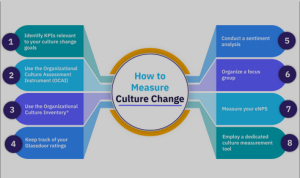Organizational culture has a profound impact on change management processes. The way an organization’s values, beliefs, behaviors, and norms are established and shared among its members can either facilitate or hinder the implementation of change initiatives. Understanding and effectively managing the relationship between organizational culture and change is crucial for successful transformation. Here are some key ways in which organizational culture influences change management:

The Impact of Organizational Culture on Change Management
-
Table of Contents
ToggleResistance or Support:
- The existing culture can either foster support for change or create resistance. If the culture is open to innovation, collaboration, and continuous improvement, employees may be more receptive to change. Conversely, a culture that is resistant to change or deeply rooted in tradition can impede progress.
-
Leadership Style:
- Organizational culture often reflects leadership styles and behaviors. The leadership’s approach to change, whether it be participative, transformational, or autocratic, can shape how employees perceive and respond to change initiatives.
-
Communication Patterns:
- Cultural norms dictate how information is shared and received within an organization. Effective communication is critical during change, and a culture that promotes open and transparent communication will facilitate the flow of information related to the change.
-
Risk Tolerance:
- The level of risk tolerance within the organizational culture can impact the willingness to embrace change. Cultures that encourage experimentation, learning from failures, and taking calculated risks are more likely to adapt to change successfully.
-
Employee Engagement:
- A positive organizational culture that values employee engagement, empowerment, and involvement in decision-making can enhance commitment to change initiatives. In contrast, a culture of disengagement or mistrust may result in resistance.
-
Adaptability and Flexibility:
- Some organizational cultures are naturally more adaptable and flexible than others. Cultures that value learning, agility, and responsiveness are better equipped to handle change and adjust to new circumstances.
-
Cultural Alignment:
- Successful change often requires alignment between the desired change and the existing cultural values. The more closely the change aligns with the core beliefs and values of the organization, the smoother the transition is likely to be.
-
Organizational Structure:
- The structure of an organization, which is influenced by its culture, can impact how change is implemented. Hierarchical cultures may have more formalized processes, while more collaborative cultures may encourage decentralized decision-making.
-
Cultural Artifacts and Symbols:
- Cultural artifacts, such as symbols, language, and rituals, play a role in shaping organizational identity. During change, leaders may leverage or modify these artifacts to signal the importance and legitimacy of the change effort.
-
Cultural Embedding of Change:
- Long-term success of change initiatives often depends on how well the changes become embedded in the organizational culture. Cultures that actively promote and reinforce the desired behaviors and practices are more likely to sustain change over time.
-
Learning Orientation:
- Organizational cultures that value continuous learning and improvement are better positioned to adapt to change. These cultures encourage employees to acquire new skills and knowledge, making them more resilient in the face of change.
In summary, organizational culture is a critical factor that can either facilitate or hinder change management efforts. Recognizing the impact of culture and aligning it with the goals of the change initiative can significantly increase the likelihood of successful implementation and long-term sustainability of change within an organization.
